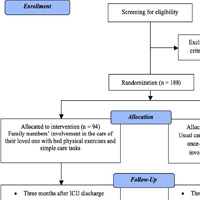Family ENgagement in Intensive Care Environments (FENICE): A quasi-experimental study protocol

Accepted: 27 May 2020
All claims expressed in this article are solely those of the authors and do not necessarily represent those of their affiliated organizations, or those of the publisher, the editors and the reviewers. Any product that may be evaluated in this article or claim that may be made by its manufacturer is not guaranteed or endorsed by the publisher.
Authors
Even if health care professionals should take into account the active involvement of families in Intensive Care Units (ICUs), little research that investigates family member’s contributions to care and includes its outcomes on both the family itself and the patient care, is available. The aim of this research project is to assess the effects of a family engagement program on family members’ satisfaction and on patients’ well-being and quality of life. A quasiexperimental study with two non-randomized groups (94 per each group) will be performed in two general ICUs of an Academic Italian Hospital. The intervention will be carried out in a single ICU and it consists of family members’ involvement in the care of their loved ones by means of bed physical exercises and simple care tasks. Participants will be evaluated through manifold outcomes: family satisfaction, assessed with the FS-ICU tool within 48 hours after ICU discharge; patients’ sense of well-being, measured with a visual analogue scale within 30 minutes after the time period of a visit; and the quality of life, investigated with the SF- 12 questionnaire within the first 48 hours after admission to ICU, at three and six months after ICU discharge by telephone. From July 2020, 188 subjects are going to be enrolled throughout the year. The latest data will be collected in December 2021 to allow the completion of the follow-ups of all participants. First, this study constitutes a significant step in a research agenda aimed at deepening the nursing sensitive outcomes in ICUs and the quality of hospital care. Secondly, the results of this study might have the potential to provide a better understanding of how families may modify patients’ outcomes and whether family members would benefit from an involvement program.
How to Cite
PAGEPress has chosen to apply the Creative Commons Attribution NonCommercial 4.0 International License (CC BY-NC 4.0) to all manuscripts to be published.

 https://doi.org/10.4081/ecj.2020.8972
https://doi.org/10.4081/ecj.2020.8972








